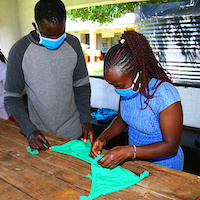How we can all help to end to violence against women
Today is the International Day for the Elimination of Violence against Women. Of course, as we often say, this is a topic that should be highlighted as often as possible. However, you can’t deny that a high profile, 16-day-long, UN-inspired annual event promoted across much of the world is a good way to raise awareness.
Orange Day is another name for the event that begins a 16-day-long campaign. It began in 2013, when UNiTE (the UN Secretary-General’s UNiTE to End Violence against Women campaign, which started in 2008) launched a global call for action to ‘Orange the World in 16 Days’. The colour orange was chosen to be a uniting theme that ran through all events as one of the official colours of the UNiTE campaign, and as a bright and optimistic colour, representative of a world free from violence against women and girls.
UN entities, civil society organizations and individuals across the world led an array of creative and highly visible events in over 50 countries. They drew attention to the issue and created opportunities for discussion around current initiatives and solutions. The initiative aimed to create the symbolic image of a world free from violence against women and girls.
And that’s what’s happening again today. Groups and individuals from all countries of the world have been invited to mark the 25th of November and the 16 days of the campaign under the umbrella of the UNiTE campaign, and to organize creative and visually striking ‘Orange Events’ in their neighbourhoods, communities, places of worship, local shops, post offices, libraries, and cinemas, and to decorate villages, towns and cities with orange flags, balloons, lights, flowers and signs which demonstrate that these activities are in support of the UNiTE to End Violence against Women campaign.
But it mustn’t stop after 16 days. You may know that Orange Days have been happening on the 25th of every month this year, highlighting such diverse and shocking themes as violence against girls, female genital mutilation and conflict-related sexual violence against girls and women. It isn’t an encouraging list but the ideal of a violence-free environment for women is worth supporting today and on all days. Which is what we do in Kenya.
We’ll tell you more about the work Friends of Londiani does in many different programmes to contribute towards the elimination of violence against women in other blogs over the coming two weeks. In the meantime, please do have a look here.
And, if you’re not already involved, please try to take part. One day it won’t be necessary, but until then anything you can do to raise awareness or support those who fight for a world free of violence against women will help to bring that day closer.

